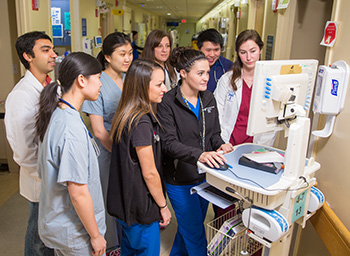 Jenna Cox, RN, (front, left) and Kristina Martin, RN, discuss a patient's record with a group of Yale nursing, medical and physician associate students on the General Medicine unit (EP 4-7).
Jenna Cox, RN, (front, left) and Kristina Martin, RN, discuss a patient's record with a group of Yale nursing, medical and physician associate students on the General Medicine unit (EP 4-7).
When Macie Boni, RN, and her colleagues on General Medicine (EP 4-7) are working with a group of nursing, physician associate and medical students, they frequently can't tell which student belongs to which group. That's what Linda Honan, APRN, PhD, likes to see.
A clinical preceptor on Yale New Haven Hospital's Surgery Trauma Step Down Unit (SP 6-4), and an associate professor at Yale School of Nursing, Honan helps lead the Longitudinal Clinical Experience program — a joint effort among Yale School of Medicine, Yale School of Nursing and the PA Program. LCE brings first-year students from each discipline together to introduce inter-professional education and lay the groundwork that will help them work as members of a team when caring for patients.
"We see people graduating from these programs who have been educated in silos," Honan said. "We need to change this, because the future of health care is inter-professional teams."
Over the academic year, LCE students spend time together in the classroom learning basic skills such as taking patients' medical histories and vital signs and conducting physical examinations. They spend a total of 15 weeks at clinical sites, including YNHH, where they shadow teams of patient care associates, nurses, PAs, physicians and other healthcare professionals. LCE was piloted three years ago on General Medicine (EP 9-7) with nine students; this academic year 118 students are doing clinical rotations at about 32 sites, including on EP 4-7 at YNHH.
"Our staff and the physicians and PAs make them a part of the team and help them through their clinical experience," said Deirdre Doyle, RN, patient service manager.
In addition to learning clinical skills in the hospital environment and working directly with patients, students get a firsthand look at the role each care team member plays. They also learn to respect each team member's contributions, which is key to quality care and patient safety, Honan said. The high reliability organization safety behaviors "mentor each other" and "practice and accept a questioning attitude", for example, are about empowering every employee to speak up and act if there's a potential for harm.
The LCE program has been such a success that next year, all 240 first-year Yale nursing, medical and physician associate students will participate, some at YNHH and some at other clinical sites.
Doyle said everyone on EP 4-7 has embraced their roles as teachers and is enthusiastic about the program.
"Our staff members are saying, ‘How come this took so long?'"
